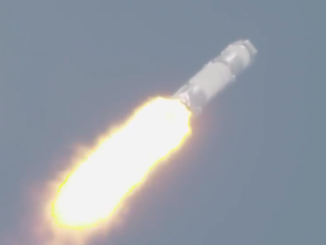
The Canadian government announced Tuesday its intention to support the International Space Station through 2024, joining the United States and Russia as the major partners officially backing an extension of the global research project.
The commitment will ensure Canadian astronauts have two flight slots to serve aboard the space station over the next decade, officials said.
Funding for Canada’s continued participation in the space station program was included in a government budget released in April, and Canadian Industry Minister James Moore outlined details of the country’s future in space Tuesday in Ottawa, Ontario.
Canada has signed up for a four-year extension to the space station program beyond 2020, following announcements from the United States in 2014 and Russia earlier this year supporting continued operations of the orbiting research outpost.
Canadian astronauts will have two opportunities to fly on six-month rotations to the space station over the next decade, Moore said.
Two Canadian astronauts — Robert Thirsk and Chris Hadfield — have lived aboard the complex during long-term expeditions. Hadfield commanded the space station and gained a sizable social media following in 2013 when he filmed a series of short videos illustrating life in orbit, including a music video covering David Bowie’s “Space Oddity.”
Hadfield and the Canadian Space Agency’s two active astronauts — Jeremy Hansen and David St. Jacques — joined Moore for Tuesday’s announcement in Ottawa.
One astronaut is guaranteed a flight to the space station by 2019, and the other by 2024.
NASA and Canadian officials will make flight assignments at a later date.
“Chris Hadfield made Canadians proud when he became the first Canadian to walk in space and command the International Space Station,” Moore said in a statement. “Our government is committed to ensuring two more Canadians fly to space within the next decade. More importantly, it confirms a great future for Canada in space for years to come.”
The Canadian government’s budget includes 30 million Canadian dollars — $24.1 million at current exchange rates — for continuing Canada’s partnership with ESA in satellite communications research.
Moore said the Canadian Space Agency provide 10.5 million Canadian dollars — $8.4 million — to MDA Corp. for technical support for the space station’s Canadian-built robotic arm, the two-armed Dextre robotic handyman, and the research lab’s mobile railcar designed to move the robot arm across the outpost.
Canada also signed up for two more years of participation on NASA’s Curiosity Mars rover.
Canada pays for 2.3 percent of the operating costs of the space station’s U.S. segment. The cost-sharing scheme calls for the Japan Aerospace Exploration Agency to pay for 12.8 percent of the U.S. section’s annual budget, and the European Space Agency covers 8.3 percent.
ESA and JAXA have not committed to the space station program past 2020.
NASA pays for the remaining 76.6 percent of the common operating costs, while Russia is solely responsible for funding its own part of the space station.
The U.S. space agency has barter agreements with ESA, JAXA and the Canadian Space Agency for the partner nations to pay for their share of the space station’s operating budget without exchanging money.
“I am delighted that Canada has committed to extending its participation in the International Space Station through 2024, and its support for other exciting initiatives with NASA in space and Earth Science including the James Webb Space Telescope and the OSIRIS-REx asteroid sample return mission,” said NASA Administrator Charlie Bolden. “The Canadian Space Agency’s Mobile Servicing System, robotics expertise and crew members continue to provide critical contributions to the ISS program.
“A commitment to continuing to utilize this tremendous resource will enable the international research community to accomplish important goals including cutting-edge research and technology development that will enable human and robotic exploration of destinations beyond low-Earth orbit, including asteroids and Mars. We look forward to our future cooperation,” Bolden said in a statement.
Email the author.
Follow Stephen Clark on Twitter: @StephenClark1.



